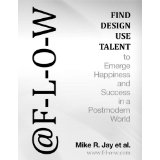 Mike R. Jay, et al. @F-L-O-W, Find, Design, Use Talent to Emerge Happiness & Success in a Post-Modern World. NP: @F-L-O-W Publishing, 2012.
Mike R. Jay, et al. @F-L-O-W, Find, Design, Use Talent to Emerge Happiness & Success in a Post-Modern World. NP: @F-L-O-W Publishing, 2012.
Barbara N. Brown

Barbara N. Brown
In his new book, @F-L-O-W, Find, Design, Use Talent to Emerge Happiness & Success in a Post-Modern World, Mike R Jay, an executive coach for 25 years, will start you on a development journey by asking some questions most of us are reluctant to address.
We understand Limits to Growth and the law of diminishing returns, but how many of us have thought to apply this to our own personal lives? Have you gone to a dozen Integral and Spiral Dynamics programs without receiving enlightenment or reaching 2nd-tier? Do you and your colleagues attend inspirational development programs and then, back in the office, notice they didn’t take? Has it occurred to you to wonder if we really can be anything we want to be? Mike suggests it would be better if we decided to simply become what we were meant to be, regardless of the pressure for MORE wealth, fame and social status.
So how did we get to this place of forever striving to become things that we are not? A century ago, the power of shaping our behavior was demonstrated by Pavlov and Skinner in conditioning experiments. Then, Nazi Eugenics gave the idea of admitting to the huge inborn differences in capabilities a sinister connotation. The result: fifty years of psychologists down the rabbit hole of Tabula rasa, Latin for Blank Slate (@BS). In its “nurture trumps all” extreme, @BS claims that individuals are simply born without built-in mental content and everything (personality, social and emotional behavior, and intelligence) comes from experience, perception and cultural bias. Although any good preschool teacher will tell you this is nonsense, the researchers were affluent white males who spent no time raising children. Not surprisingly, they missed the obvious: we begin different. Different is not broken!
Cutting edge psychologists and neurologists were rejecting @BS 50 years ago, but the insidious damage was already done. Society accepted the propaganda – one size fits all. Mike points us to an interesting book by Edward Bernays, Propaganda, published in 1928. Republicans point to this book as the beginning of the liberal media conspiracy to indoctrinate America. However, Bernays himself says the propaganda techniques he suggests are being used much more broadly in business than in politics. How, Bernays asks, can we grow an economy if people buy only what they need? If people were to buy more, businesses could raise salaries and then sell even more as incomes rose. Hence the cult of more and the myth of economic growth at all costs were born. FDR and Ike embraced the idea with equal fervor. Like many leading thinkers, Mike suggests that conscious individuals should step off the more bandwagon. In @F-L-O-W, Mike provides a practical blueprint for doing this as unique individuals within like-minded communities.
As Don Beck reminds us, to make a change we must know clearly “from what, to what”. Mike suggests that while everyone is not created equal, we aren’t broken, just different. We may not be able to be anything we want, but we can become anything we are and can be. If we unconditionally accept ourselves and those around us, we may begin to understand what it is we can be. Development through introspective, personal perfection quickly reaches a point of diminishing returns as we move away from natural strengths. If we need to change, we should first alter our Life Conditions, with Scaffolding from a compatible community.
Economists are wrong; human beings are not rational. Replacing needs with wants and thinking all problems can be solved by unchecked growth are clear examples. If true needs were to replace wants, exponential growth would not be required. Many of us have experiences like a deer in the headlights in the face of the noise of increasing complexity. Andrew Cohen has recently reminded us that we are the “luckiest people in human history”, and yet this run-away train of MORE will surely derail if significant numbers don’t start gently applying the brakes.
The earlier version of @BS, the Protestant work ethic, was a valuable meme that lifted millions of American peasants out of poverty after the Civil War. The Republicans are not wrong, poverty is a choice; however that’s only true after an individual has the reached the modern (Orange) level of development. Americans attempted to solve this problem first with public education and then with corporate training programs. Now we’re doing ITP without confirming that development IS a choice.
So what alternative does Mike propose?
1) Start with Awareness, in the form of self-knowledge about our talents, Type, development level and current capacity. Note this is not self-awareness because the majority of humans are not yet ready for modern and post-modern introspection. We all have gaps where we still can’t see our own lack of capacity. Rebuilding and reinforcing our positive capacity to exist in levels we’ve already mastered will build a firmer foundation for times when we must move up to move on.
2) Find your Purpose by stopping all pretense of being things you are not. Know what is meaningful to you and say a clear Yes or No accordingly. As Kegan and Garvey-Berger point out, we are “Subject” to our own constructed reality. It’s not always possible to see the obvious holes. That’s where Scaffolding from a purposeful community comes in, so reach out.
3) So, how does one become more Competent in the most effective way? First, perhaps you might want to design your life to flow around the biggest gaps instead of expending all your energy on filling in your deepest holes. Again, you’ll need feedback and help to make this work. The Lone Wolf is an endangered species. And of course, values matter, so understand yours.
4) Mike’s 4th pillar is Wellth, a combination of wellness and results. He reminds us that it’s necessary to keep score. Are we making progress on the things that are important to us? When we keep score, we will find the need to recalibrate often. The world is changing, and our path will need to be continually modified. To get the best results, culture will be a key. Or, to be more precise, your micro-culture, so be sure to surround yourself with people who were going in the same direction.
Those of you who are into development theories might have noticed there are a few more possibilities. After reading the book, join some of Mike’s classes at http://f-l-o-w.net/ or stay tuned for the 2nd edition of the book.
About the Author
Barbara Brown has spent 30 years helping corporations manage the complexity of large multinational IT systems. Barbara founded Technology Transformations to work with SMB’s providing sustainable, integrated 2nd tier business strategies. She applies innovative strategic planning, systems theory and organizational development methodologies to drive optimal design and effective implementations. Barbara is an advocate and connector, facilitating collaboration for mutual success among the integral community, startup businesses and freelance consultants in the Houston area. She hopes smaller profitable stable business models will provide a compelling alternative to toxic mega-corporations.
